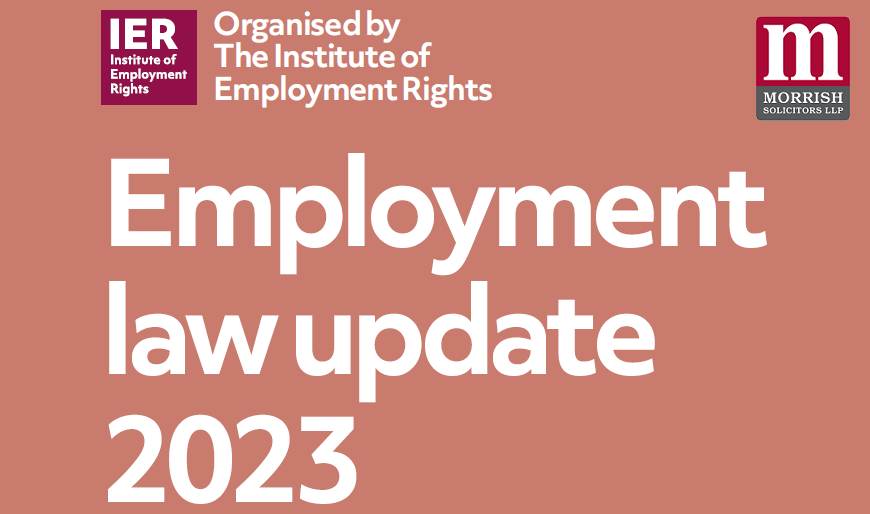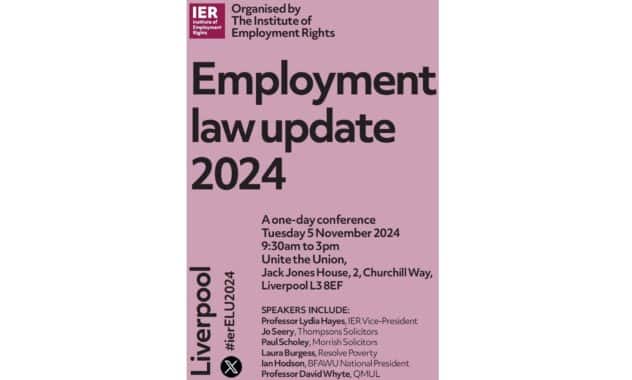Employment Law Update 2023 (London)
Our highly popular annual update on statute, case law and employment rights

Event blog
This annual Institute event providing an update on employment law developments took place in front of a well-attended audience on 23rd March 2023 at the HQ of Unite the Union in London. Experts from Thompsons and Morrish Solicitors were joined by Regional Employment Judge, Rohan Pirani, Janet Farrar of the UCU and Sarah Woolley from the BFAWU as well as the Institute’s President, Professor Keith Ewing to present not only the latest impact of new legislation but also with analysis on how trade unionists can respond to the threats that these pose to the trade union movement.
The event was opened by the Chair, Adrian Weir, from the Campaign for Trade Union Freedom who welcomed delegates to the first in-person conference since the pandemic. He thanked Unite for providing the venue and Morrish Solicitors for their kind sponsorship. He referred to the impact of recently proposed legislation on the ability of trade unions to organise and protect workers’ rights. In introducing the first speaker Sarah Woolley, the Chair invited her to explain how BFAWU and others were organising workers to resist authoritarian laws which are being introduced into the UK.
Sarah Woolley, General Secretary of the BAFWU told the conference how her union had organised in order to resist the authoritarian laws introduced by government. She emphasised the limits of law in protecting workers’ rights and the need to work outside the box in resisting challenges from employers. She specifically referred to the severe restrictions on the ability of workers to take strike action. Despite this gloomy outlook, Sarah told delegates that the law was not the answer. She reminded the conference that workers are now increasingly meeting the thresholds to allow industrial action, illustrating the benefits of collective organisation and solidarity. The last few months and support for strikes from the general public meant right wing media outlets were less influential than used to be the case. Trade union activists, trades councils and the public are all contributing to a feeling of greater solidarity.
In stressing the importance for education around trade unions and what they are about, Sarah argued for a revision of the teaching of our history in schools. History needed to be more relevant and modern. There was a need to capture the campaigns that young people were involved in and linking those to the collective action of workers in the past, as part of the understanding of the role of trade unions.
Sarah talked about the project that her union had been involved in. Over the last 6 months ‘Organise Now’ has taken the organising message into sectors where workers had traditionally not been organised and equipping them with the skills to fight for decent work and conditions. She presented many current examples of successful campaigns which had delivered increased wages and conditions. The trade unions needed to speak the language of young people and ensure the message of organising was relevant to them. She concluded by saying that people should not have to put up with bad employers, insecure employment and poor wages and exploitation.
Sarah was followed by Janet Farrar, President of the UCU, who spoke about her experience of planning and running a large scale dispute. Janet explained the context of UCU’s current position from the aggregated ballots successfully held last year. UCU was now in the process of re-balloting for further action this year. She emphasised the detailed preparation required to secure successful ballots and the impact this has and those responsible for the process.
This work had had side benefits of large increases in membership and learning the benefits of social media. Janet explained the plan for their campaign including organising, directing anger at the employers, boosting confidence, getting the vote out and then chasing the vote out. The central campaign was led from their head office using social media and live viral events. This was enhanced by grassroots organising in the workplaces and ensuring the local reps buy-in to the campaign.
Maintaining constant contact with reps and members, using both tech and mailings, was crucial to the campaign, as was chasing the vote out. Janet said that encouraging members to talk to other members, increasing engagement and recruiting non-members helped secure new activists through this face to face activity. She referenced anger-hope-action as a structure for the conversations with fellow workers and the importance of teaching people how to use this technique. Equally the importance of listening and emphasising injustice, whilst highlighting that this was about all universities. Offering confidence to individual members in attending meetings talking to others and voting. Planning the responses to difficult questions from members. Making sure members have a ballot paper and knows how to vote and the deadline. Maintaining membership details up to date was also crucial to the whole process.
Questions from the audience covered a wide range of topics including challenges of communication, lessons learnt from previous ballots, and how reps’ conversations with members were managed to ensure you avoid legal challenges. This highlighted some of the challenges in the private sector where high turnover of staff added to organising problems in underrepresented sectors. Janet said a lot was learnt from the first aggregate ballot and adjustments were made for the current ballot.
Following a coffee break, Iain Birrell of Thompsons presented an overview of current industrial and legal issues. He kicked off by placing in context the industrial legal issues affected by the country’s economy and other global events. In describing the current government he referred to the dearth of political and intellectual talent and a government riven with division, with short term policies to counter internal opposition. He also highlighted the swing in public mood as referred to by a previous speaker.
The government response to all of this had increased the level of trade union restrictions making it even harder to take strike action. It also had made taking action more riskier and less effective. The introduction of allowing agency workers to break strikes and also the minimum service levels proposals sought to undermine workers’ ability to defend their working conditions. The minimum service level proposals have been described as unworkable since determining the levels rests with the Secretary of State. The proposals requires unions to instruct members to break the strike, the penalties for which are substantial both collectively and individually.
Iain then turned to legal cases which had challenged action against unions ability to organise and bargain collectively. Kostal [2019] case protected the union’s seat at the bargaining table. In the Ineos [2022] case where an offer was imposed and calling it ‘final’ didn’t automatically make it ‘final’. Jiwanji [2022] established that the employer could not just decide alone that collective bargaining was concluded. Single table bargaining agreement requires all parties to agree to the outcome.
Iain then looked at the case of Mercer [2021]. He said this was very important in defending trade union activities. The applicant was suspended and argued that it was a breach of her rights. The legislation gives protection on your own time or during work time with the employers agreement. This is currently listed at the Supreme Court and if successful would provide am level of protection for industrial action not previously seen.
He also told the conference that central planks of contract law could be unravelled by a Supreme Court case involving Tesco’s. USDAW are challenging the right of the employer to get rid of ‘forever’ rights under contract law.
Questions involved issues surrounding Article 11 rights and UK legislation; the impact, or lack of it, of ECHR Decisions which normally, at best, results in a certificate of incompatibility.
The first speaker after lunch was Rohan Pirani, Regional Employment Judge, who reminded delegates of the need for preparation when appearing at Employment Tribunals. He told delegates that we had come a long way from the start of Industrial Tribunals and warned that people should be careful for what they wished for. Other areas of law were frequently rushed through in short time whereas tribunals could expect a minimum of 2 days for unfair dismissal and much longer for other cases.
He also warned that headlines often misrepresented the realities of big wins at tribunal.
Increasingly digital access was the means for pursuing a tribunal claim. He alerted members to the categories of cases which the tribunal places cases. The short and standard tracks default to video and are dealt with much quicker. Open track cases (discrimination elements) were longer and automatically get listed for telephone case management hearing and take much longer to list. Unlike other civil claims there are no application forms used in connection with issues so applications to the tribunal are made through email which accumulate in local tribunal offices. Email triage determines where emails go and the limitation periods are, in most cases, 3 months.
He commented that there is often a proliferation for causes of action and there was a need to concentrate on the most serious and recent allegations. Tribunal Chairs dislike proliferation. ‘The more you put in the less you are likely to win’. The danger is you bore the judge to death!
Rohan also referred to remote hearings. The method used is CVP and there exists a ‘virtual region’ where if no judge is available in the region it can be sent to the virtual region where an available judge may be found. He acknowledged that there were pros and cons of virtual hearings. Accessibility improved but focus by parties can sometimes be less. Parties are more favourable towards virtual hearings than judges.
Rohan presented a judicial perspective – judges have other things to do throughout a three day hearing. No reading time is provided for so evidence has to be read on first day. If bundles run to hundreds of pages this slows down the process. He offered some quick tips. The ET1 is best chance to convince a tribunal to make your case. Applicants must outline the issues as well as tell the story, and set out the outcomes you seek, but be concise. He also told delegates that they should make sure that the advocate attends pre hearings because that is when the timetable for the case will be determined.
Rohan also talked about judicial assessment and judicial mediation, explaining the concepts and their usefulness in certain circumstances. In referring to witness statements he suggested that lawyers were not trained adequately to draft and that frequently they ended up being drafted by ‘committee’. Whilst statements needed to cover the story they should also describe the points of action required.
During the Q&A session that followed, Rohan explain the process of Alternative Dispute resolution and again stressed the need for adequate preparation.
This session was followed by an interesting analysis of religion and belief discrimination from Paul Scholey of Morrish Solicitors.
Paul referenced the Equality Act 2010 and explained lack of belief. He focussed on the discrimination claims arising from these issues.
His starting point for philosophical belief was based on The Grainger case where he outlined the five principles: Genuinely held belief; belief had to be weighty and substantial aspect of human life and behaviour; it had to attain a certain level of cogency, seriousness, cohesion and importance; it should be worthy of respect in a democratic society, not incompatible with human rights and finally should be of a similar status or cogency to a religious belief.
As an example from older cases he referenced a tribunal finding that being opposed to fox hunting could be philosophical belief but that not all animal welfare issues would meet that criteria.
In religion case and the LGBTQ+ community he drew attention to a decision that refusal to carry out functions was not held to be a reasonable belief.
Paul went on to describe some key cases including Forstater, Makereth and Bailey v Stonewall which had addressed issues relating to the Trans community and how the outcomes had differed.
In a more recent case Paul highlighted the McLung case where lifelong support for a football team did not amount to a philosophical belief but was more a lifestyle choice.
During questions a delegate raised the issue of whether a trade unionist refusing to cross a picket line, in light of requirements in the minimum standard levels legislation, could use an argument of fundamental belief as a claim for discrimination. Paul replied that it was an interesting question and if the situation arose he would be happy to take the case.
The final speaker of the day was Professor Keith Ewing, President of the Institute, who, as always, brought a clear and precise analysis of the current state of the rights of trade unions and the direction in which we were heading. He began by highlighting three features of the Minimum Services Levels legislation: – the fact that government ministers would determine levels of service in six sectors defined in the 2016 Trade Union Act and that no guidance was provided in the Bill as to what level of service is required as a minimum level; his second point was that there is no provision for parliamentary scrutiny of the ministers actions; and finally that there is a limited obligation to consult with anyone else before making its decisions.
Keith also pointed out that when regulations were in place and a successful strike ballot had been held, it was open to the employer to identify who was required to work and to specify the work to be done. In effect this amounts to a “power of the employer authorised by the state to requisition workers to strike break”. The employer could choose any worker, including a shop steward. If the individual refused the employee could be dismissed with no right to claim unfair dismissal.
The Bill also places a duty on a union to take reasonable steps to comply with the work notice. Keith posed the question ‘what is a union required to do?’ Not to discourage? Inform people and encourage them to go to work? To instruct members to cross picket lines? Is there a duty to instruct pickets not to persuade people issued with a work notice? The consequences of a failure to comply would render the strike unlawful and the union could be sued and face substantial damages, recently increased by the Trade Union Act 2016. Workers not subject to a work notice would also have their protection against dismissal removed as the strike would have become an unlawful strike.
Prof Ewing asserted that the provisions were almost certainly a breach of International Law – ILO convention 87 on freedom of association/minimum service levels. He pointed out that the legislation must provide genuine minimum service. The UK Legislation doesn’t provide such guidance. The service which could be required has to be strictly necessary to meet basic needs. The levels must not be at such a level that they violate the effectiveness of the industrial action.
And finally Prof Ewing said that all of this should be done by agreement. The UK law does not provide for this. He also reminded the conference that the legislation would be in breach of the free trade agreement with the EU which agreed that international legal obligations should be adhered to.
Following final questions, the Chair brought what had been an extremely informative and interesting conference to a conclusion by thanking delegates for attending and the speakers for their contributions.

– Roger Jeary IER
Download event documents
- ELU-slides-London-23-03-23-FINAL.pdf - 2.13 MB









